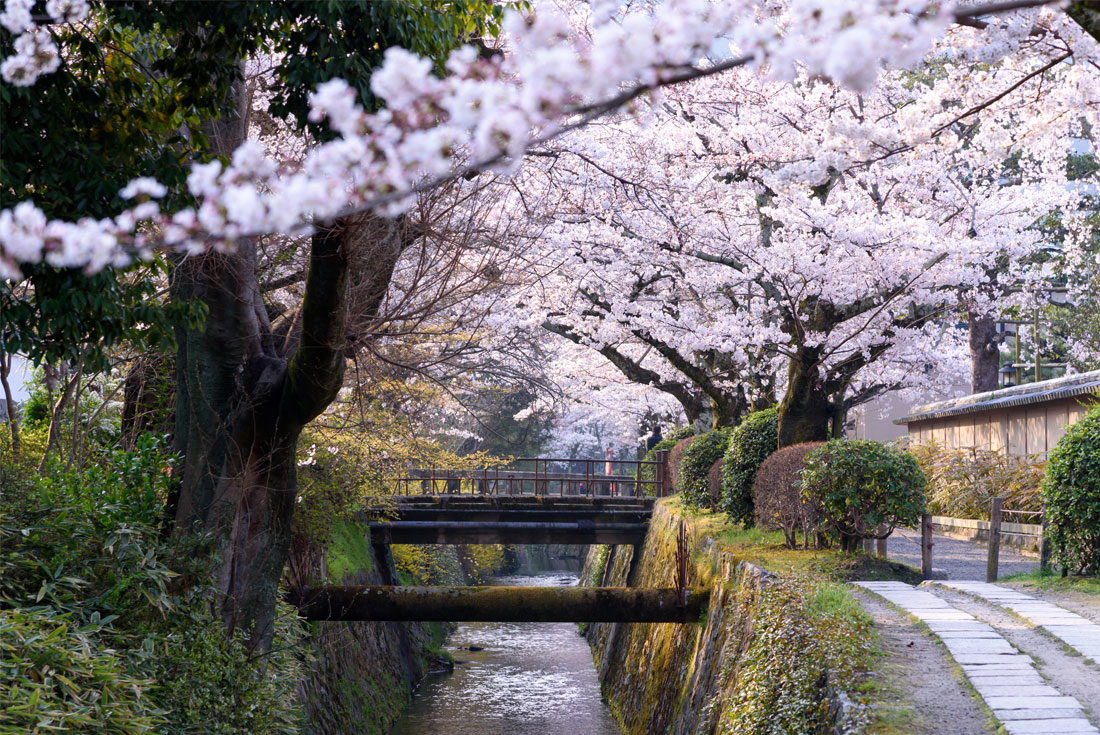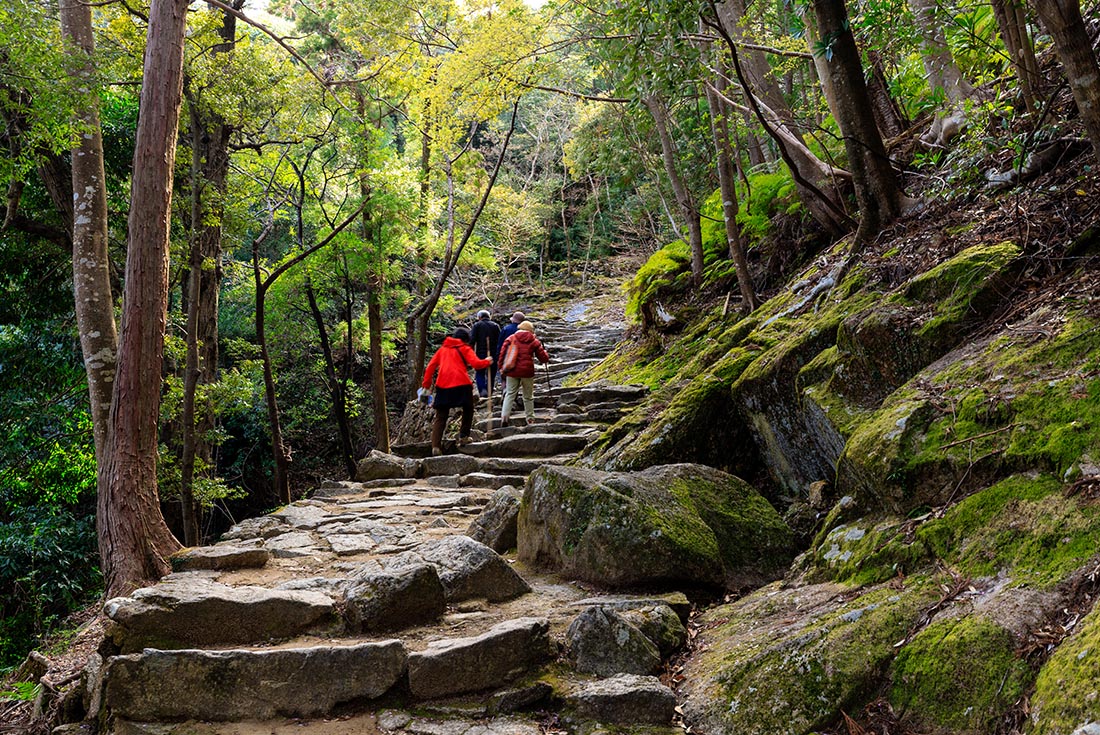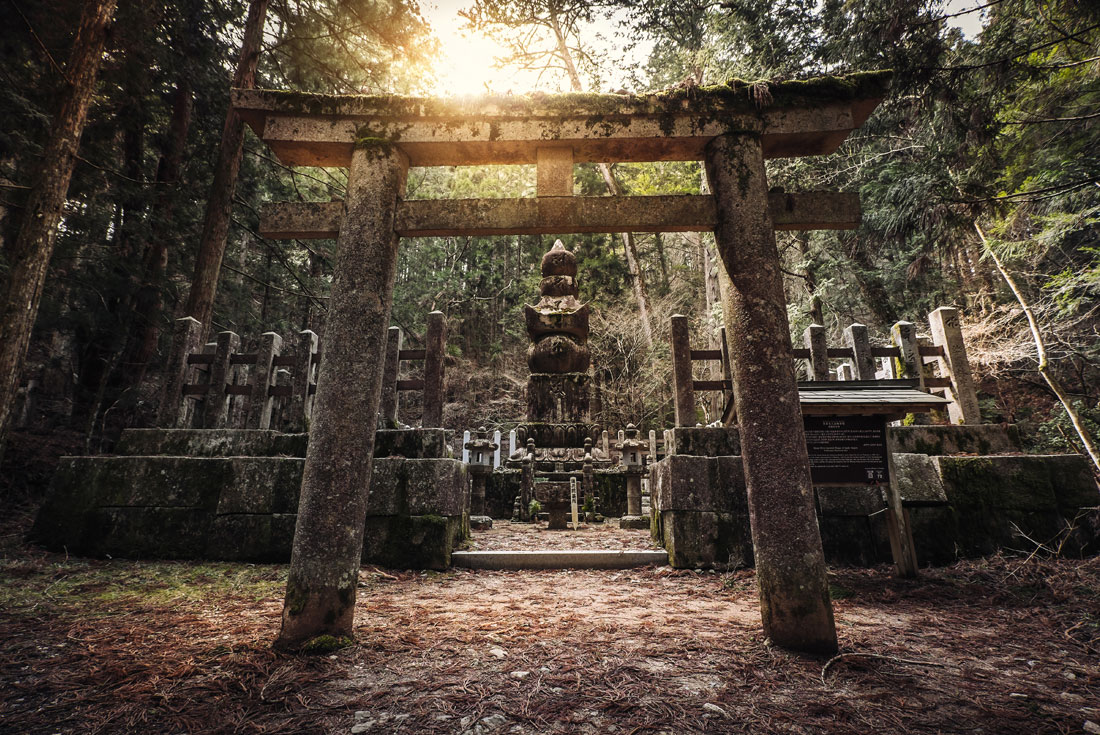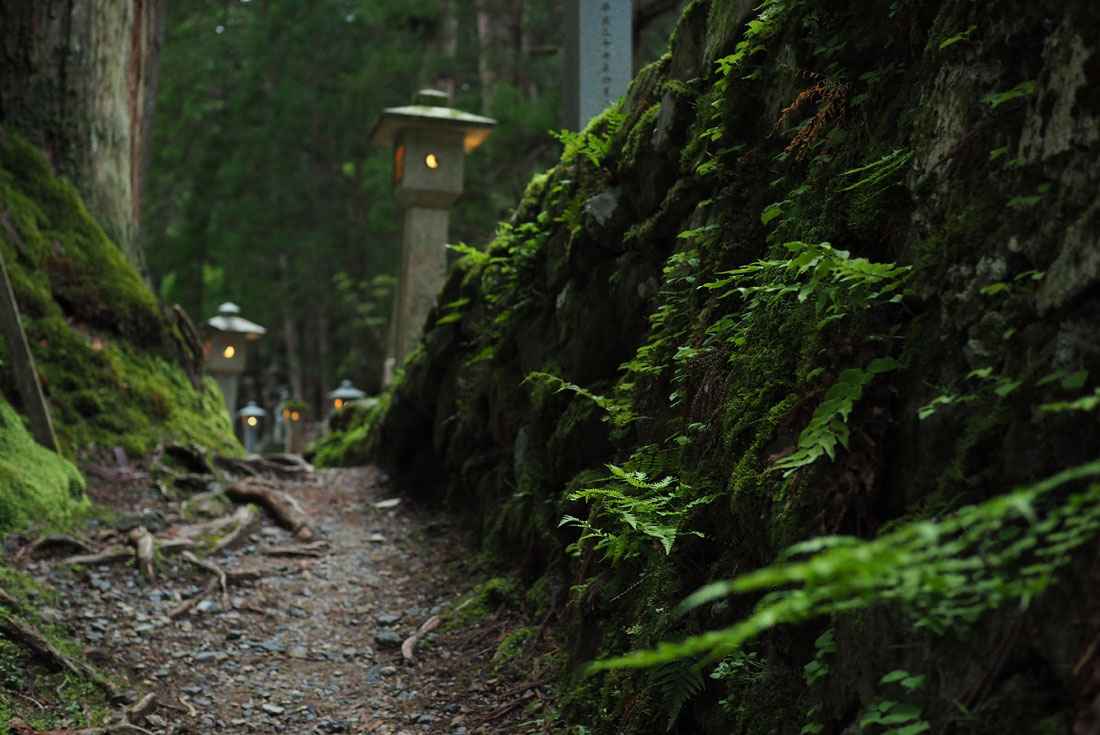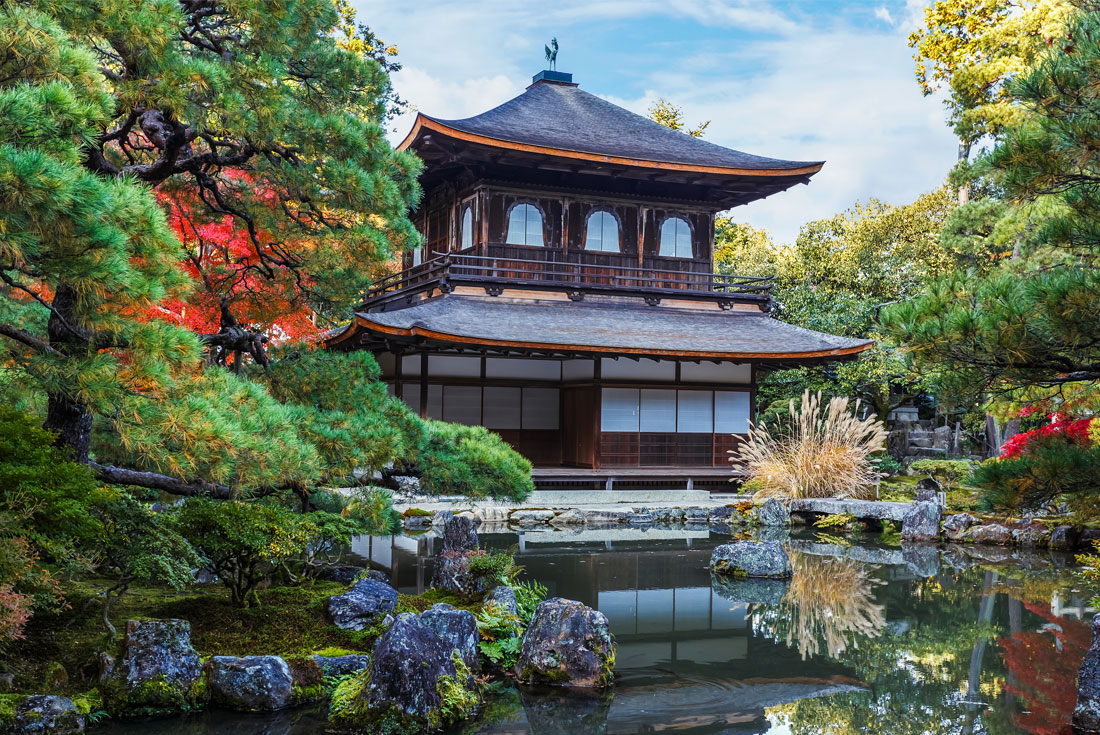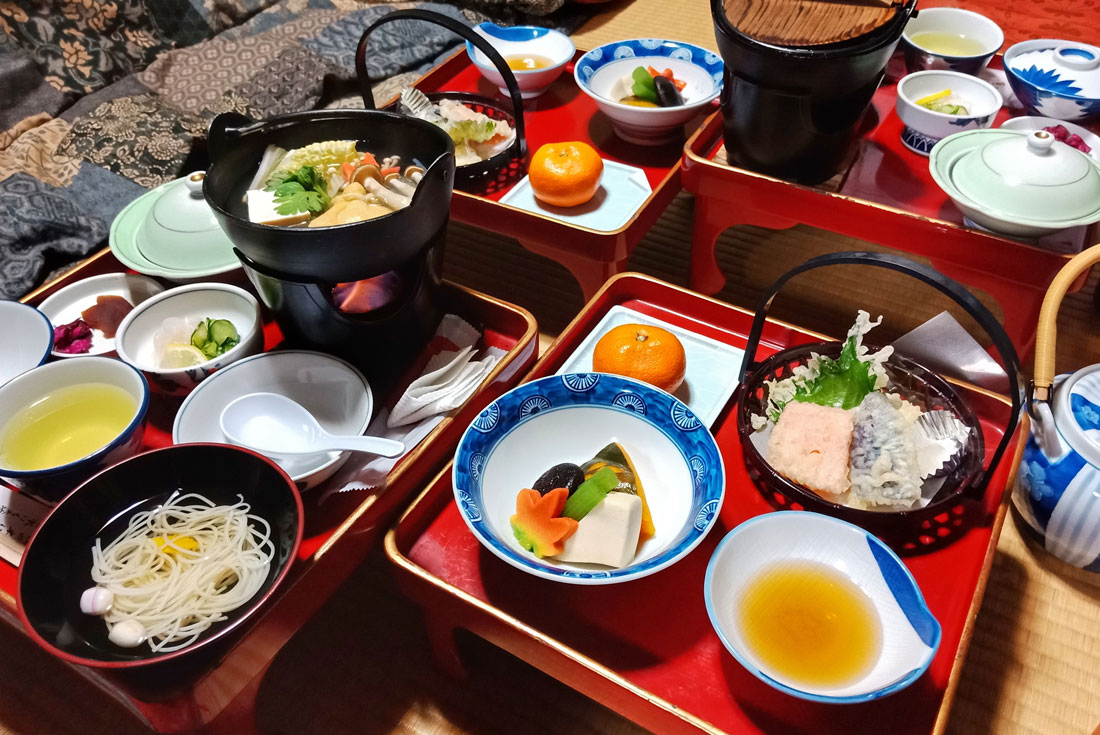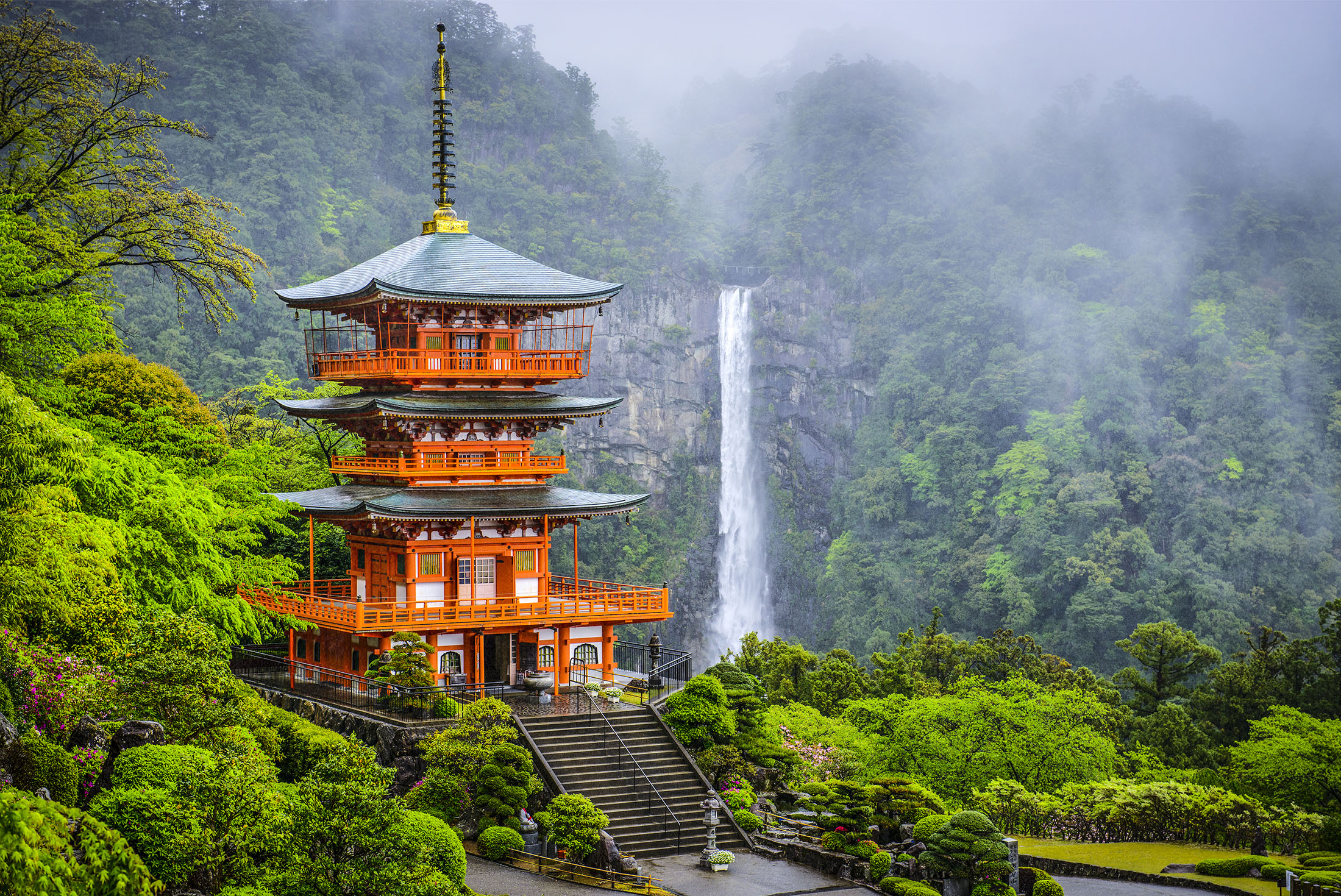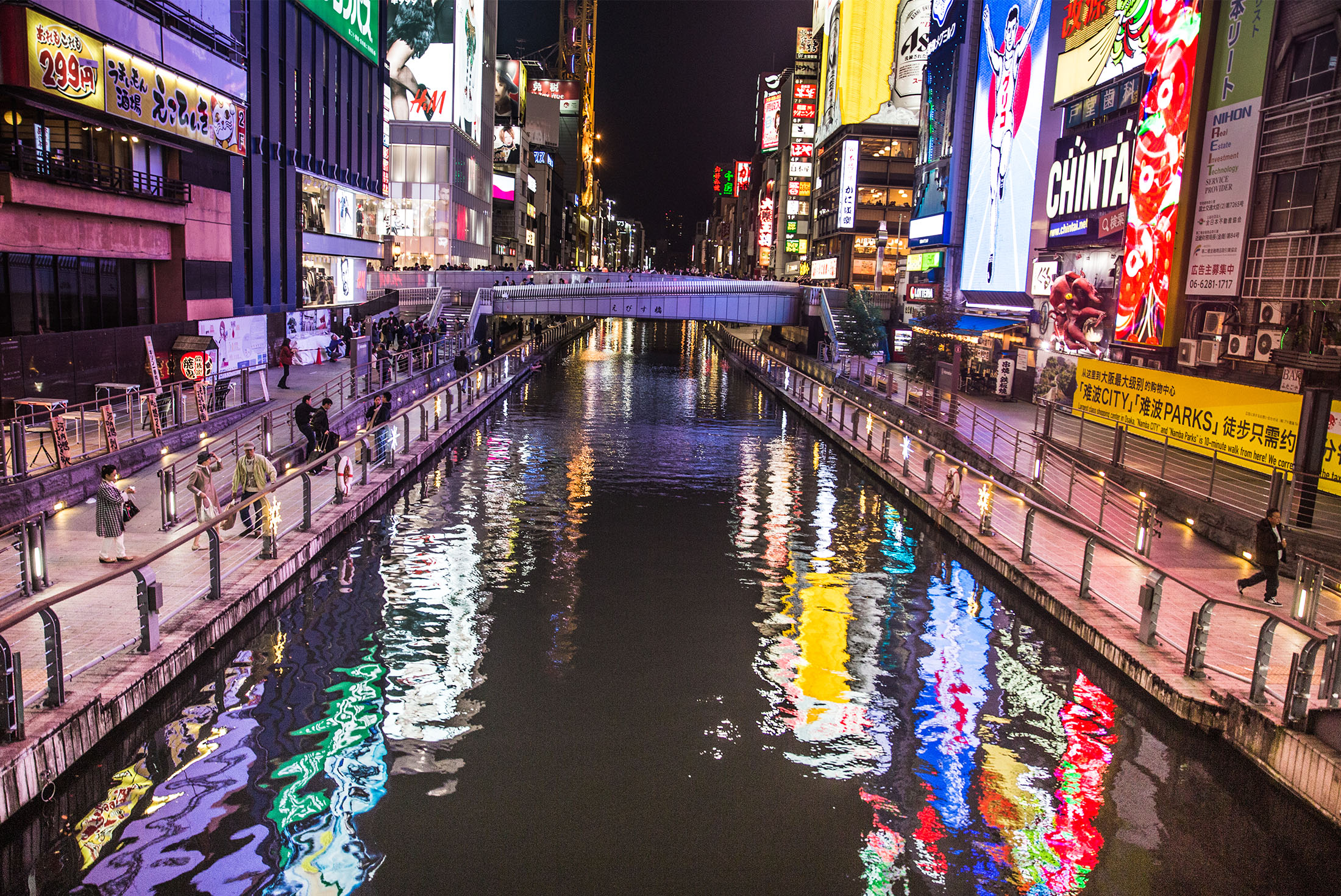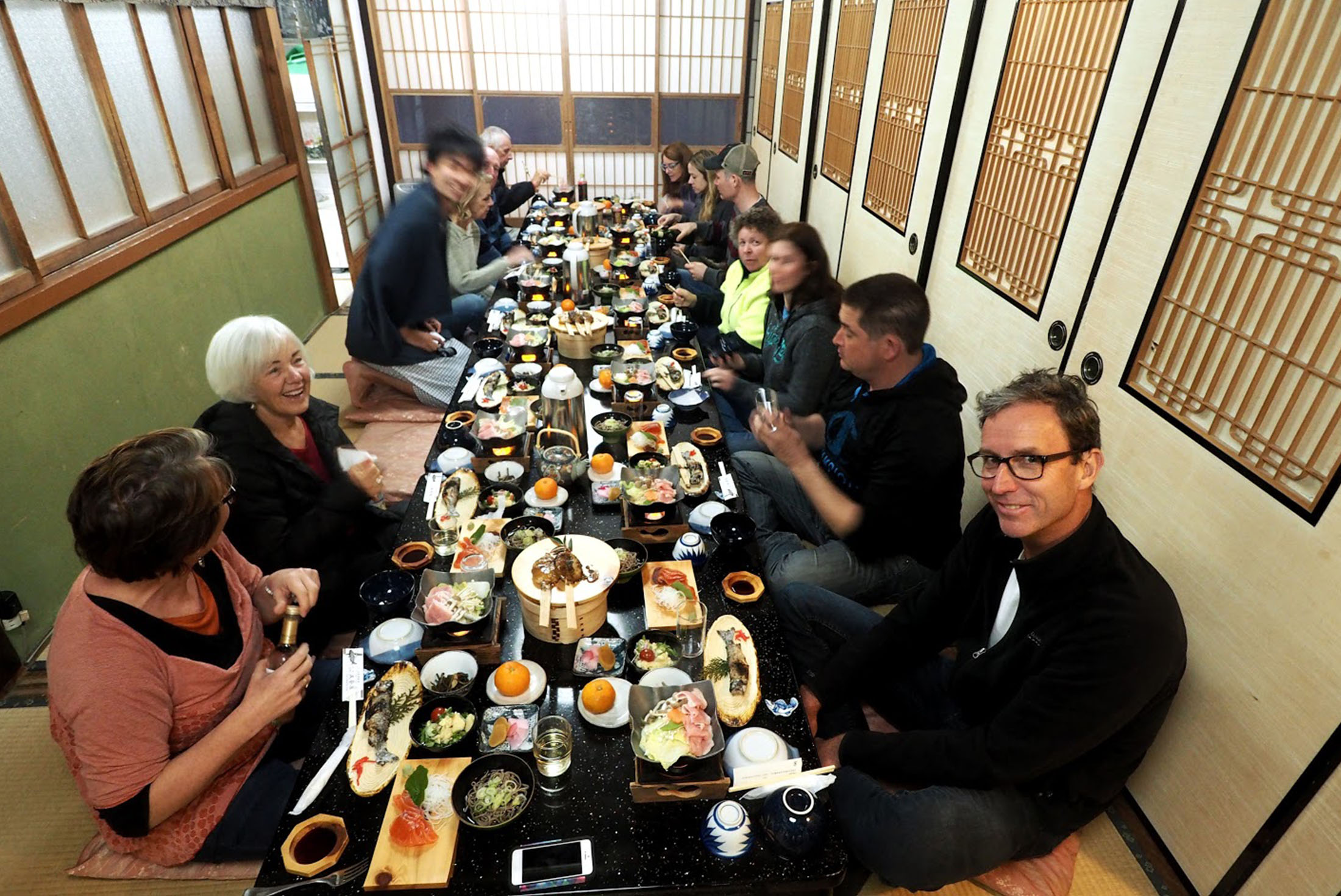- Explore Kyoto on a couple of nearby hikes for a different perspective on the life and culture in this notable city, as well as visiting some sites of natural and religious significance.
- Experience two of the main religions in Japan – Buddhism and Shintoism – by following the footsteps of ancient pilgrims on their quest for faith along the Koya-san and Kumano Kodo trails.
- Discover two of the major cultural hubs of Japan on foot, walking the Philosopher’s Path in Kyoto and strolling through the Dotombori district in Osaka.
- Join in on the morning prayers and share a traditional shojin ryori (Buddhist vegetarian) meal during an overnight temple stay in Koya-san, deep in mountainous Wakayama prefecture.
- Soak in an ancient onsen after a day of trekking in Yunomine – there's no better way in Japan to relax and rejuvenate, as well as understand local cultures, than in the natural mineral waters of a hot spring.
04 Jul 2023
Japan: Koya-san & Kumano Kodo Trek
CJXK
Validity: 01 Jan 2023 to 31 Dec 2024
Stray off the tourist trail with an eight-day trekking adventure on some of the ancient pilgrim routes in Japan. The Koya-san and Kumano Kodo treks take you deep through the wilderness and into the mountainous landscapes of Honshu, as well as provide insight into the strong connection with past and present pilgrims hiking these historic routes. Along the way, stop by peaceful temples and tranquil monasteries, soak in traditional onsen and discover the cultural hubs of Kyoto and Osaka. This small-group adventure will give you both a physical and cultural workout around the best of enchanting Japan.
Original
Walking & Trekking
Train,Private vechicle,Taxi
3
The walking on this trip is over easy to moderate terrain and distances covered can vary from 5 to 20 km (please check day descriptions for details). Some of the walks are circular but some can be out-and-back walks. Be prepared for daily ascents and descents, sometimes with short, steep sections. Terrain can be rocky with loose gravel, or with roots, which may become slippery when wet. This tour is ideal for nature lovers and the leaders set an even pace, providing time to take photos and to appreciate the beautiful surroundings.
Agora Kyoto Karasuma
701-1 Myodenji-cho, Shimogyo Ward
Kyoto
600-8472
JAPAN
Phone: 81 75353118
There are two international airports servicing Kyoto. Itami Airport (ITM) is 50kms/30miles southwest of Kyoto. Kansai Airport (KIX) is 100kms/60miles southwest of Kyoto. Taxis are available but cost upwards of USD250. If you have any concerns on arrival in Japan, please call our Kyoto-based team on +81 70 1771 5588. Arrival at Kansai Airport (KIX) From Kansai Airport (KIX) you can reach Kyoto Station via express train or limousine bus. From Kyoto Station, you can take a taxi or the subway to Agora Kyoto Karasuma. If your flight arrives before 6am or after 9pm, be sure to check departure times of your chosen service. The express train from Kansai Airport is called the Haruka Airport Express. It costs approximately JPY3600 and takes 75 minutes. Alternatively, the limousine bus service costs approximately JPY2500 and takes 90 minutes. On arrival at Kyoto Station, a taxi to the hotel will cost approximately JPY1500. Alternatively, you can take the subway, travelling on the Karasuma line to Shijo Station. Please refer to the transport details on the hotel’s website: https://www.agora-kyoto.com/karasuma/en/ Arriving at Itami Airport (ITM) From Itami Airport (ITM) you can reach Kyoto Station via limousine bus. From Kyoto Station, you can take a taxi or the subway to Agora Kyoto Karasuma. If your flight arrives before 8am or after 8pm, be sure to check departure times of your chosen service. The limousine bus service costs approximately JPY1500 and takes 60 minutes. On arrival at Kyoto Station, a taxi to the hotel will cost approximately JPY1500. Alternatively, you can take the subway, travelling on the Karasuma line to Shijo Station. Please refer to the transport details on the hotel’s website: https://www.agora-kyoto.com/karasuma/en/
The Bridge Hotel Shinsaibashi
1-10-24, Nishishinsaibashi, Chuo-ku, Osaka-shi 大阪府大阪市中央区西心斎橋1-10-24
Osaka
Osaka
542-0086
JAPAN
Phone: +81 649636501
The Bridge Hotel Shinsaibashi is centrally located in Osaka, just a 3-minute walk from Shinsaibashi Station subway line and a 10-minute walk from the famous Glico Man advertising sign. It's a convenient location for exploring the sights of Osaka.
Japan has a very efficient public transport service and there are many ways to get from your hotel to the two international airports in the Kansai region (Kansai Airport (KIX) or Itami Airport). Kansai Airport (KIX) is about 50km southwest of Osaka and Itami is about 12km northwest. Please talk with your leader or consult with the hotel's reception desk or check the hotel website for more transport details: http://bridge-h.co.jp/en/access/ Please note that we are currently not able to provide any shared shuttle bus service from the two airports to your hotel in Osaka.
1. As this is an active hiking trip you will need to have an excellent level of fitness. Please read the itinerary carefully to make sure that you'll be able to make the most of the activities on this trip and enjoy an active adventure in Japan. 2. Your luggage will be forwarded to the next destination at different points of the trip, but you'll still need to be able carry a small day pack during the hiking. 3. A Single Supplement is currently not available for this trip due to limited rooms at many of our properties. 4. We are currently unable to book pre or post tour accommodation at our start & finish point hotels due to limited room availability. We recommend booking a hotel of your choice through an online booking engine if you are planning to stay longer in Japan. 5. This trip does not include a Japan Rail Pass. If you are planning to travel in Japan before or after your trip you will need to purchase your own Japan Rail Pass in advance or individual tickets in country. 6. It is essential you pack light and compact for rail travel in Japan. From May 2020 there will be size restrictions for luggage on Shinkansen trains. Luggage over 160-250cm may require an additional 1000 JPY oversize luggage fee per train journey. Luggage over 251cm will NOT be permitted on the Shinkansen trains at all. Please notify your tour leader at your Welcome Meeting if your luggage is over 160-250cm so they can make the necessary arrangements.
All group trips are accompanied by one of our group leaders. The aim of the group leader is to take the hassle out of your travels and to help you have the best trip possible. Intrepid endeavours to provide the services of an experienced leader however, due to the seasonality of travel, rare situations may arise where your leader is new to a particular region or training other group leaders. Your leader will provide information on the places you are travelling through, offer suggestions for things to do and see, recommend great local eating venues and introduce you to our local friends. While not being guides in the traditional sense, you can expect them to have a broad general knowledge of the places visited on the trip, including historical, cultural, religious, and social aspects. At Intrepid we aim to support local guides who have specialised knowledge of the regions we visit. If you are interested in delving deeper into the local culture at a specific site or location then your leader can recommend a local guide service in most of the main destinations of your trip. Due to the rapid increase in tourism in Japan and in the lead up to the 2020 Tokyo Olympics it has been necessary to go outside our traditional sources for employing tour leaders. As a result, our passionate, professional and trained tour leaders may either be Japanese or long term foreign residents in Japan.
Most national governments provide regularly updated foreign travel advice on safety issues involved with international travel. We recommend that you check your government's advice for their latest travel information before departure and ensure that your travel insurance covers you for all destinations and activities on your trip. Please refer to our website's safety page for links to major travel advisories and updates on safety issues affecting our trips here: https://www.intrepidtravel.com/travel-alerts We strongly recommend the use of a neck wallet or money belt while travelling, for the safe-keeping of your passport, flight tickets, cash and other valuable items. Leave your jewellery at home - you won't need it while travelling. Many of our hotels have safety deposit boxes, which is the most secure way of storing your valuables. A lock is recommended for securing your luggage. Your leader will accompany you on all included activities, however, during your trip you'll have some free time to pursue your own interests or relax and take it easy. While your leader will assist you with the available options in a given location, please note that any optional activities you undertake are not part of your Intrepid itinerary, and Intrepid makes no representations about the safety of the activity or the standard of the operators running them. Please use your own good judgement when selecting an activity in your free time. Please also note that your Leader has the authority to amend or cancel any part of the trip itinerary if it's deemed necessary due to safety concerns. Intrepid's operational safety policies can be viewed on our website at the link below. We recommend that you take a moment to read through this information before travelling, and would appreciate any feedback on how safety is being managed on our trips.
https://www.intrepidtravel.com/safety-guidelines
JAPAN Crime levels are low. It is generally safe to walk around at night and to travel on public transport, but you should maintain the same level of vigilance as you would at home and take sensible precautions. Reports of inappropriate touching or ‘chikan’ of female passengers on commuter trains are fairly common. The police advise that you shout at the perpetrator to attract attention and ask a fellow passenger to call the train staff. The Roppongi entertainment district of Tokyo is considered a higher risk area for crime.
PASSPORT You’ll need a valid passport to travel internationally and most countries require your passport to have a minimum of 6 months validity, so remember to check the expiry date. We need your passport information to get everything ready for your trip so it’s important that the information on your booking matches your passport exactly. Please take care to provide the correct details. We recommend carrying a copy of the photo page of your passport while travelling and leaving a copy at home with family or friends. VISAS Many countries require a visa and obtaining the correct visa is your responsibility. We recommend you check your visa requirements as soon as you have booked your trip. This will ensure you have time to prepare your documents and for your visa application to be processed. Entry requirements can change and are different depending on your nationality. Please refer to your government's foreign travel advisories, the consular websites for the countries you’re travelling to and those you may transit through. Always follow visa advice from official websites; not all visa information found online may be valid. You can also head to Intrepid’s Entry & Health requirement page to get the latest information on travel documents and visa requirements, plus local government COVID-19 vaccination and quarantine policies: https://www.intrepidtravel.com/au/visa-health-requirements JAPAN VISA Japanese visa exemption will resume from 11 Oct, 2022 for 68 countries, including Australia, New Zealand, Great Britain, United States, Canada, Germany etc. Please check here for a full list of countries https://www.mofa.go.jp/j_info/visit/visa/short/novisa.html There are still entry requirements effective for Japan. This includes but is not limited to: • Be triple vaccinated and provide a vaccine certificate, OR • Have a negative PCR test result taken within 72 hours before departure*. *Please note that Japan has strict requirements for the PCR test result format. Please consult your closest Japanese embassy or consulate on the format approved and the clinic that may provide the result in such format. For approved vaccine list, please refer to this https://www.mhlw.go.jp/stf/covid-19/border_vaccine.html Please contact your closest Japanese embassy or consulate to stay updated with all entry requirements.
Explore Kyoto on a couple of nearby hikes for a different perspective on the life and culture in this notable city, as well as visiting some sites of natural and religious significance.
Experience two of the main religions in Japan – Buddhism and Shintoism – by following the footsteps of ancient pilgrims on their quest for faith along the Koya-san and Kumano Kodo trails.
Discover two of the major cultural hubs of Japan on foot, walking the Philosopher’s Path in Kyoto and strolling through the Dotombori district in Osaka.
Join in on the morning prayers and share a traditional shojin ryori (Buddhist vegetarian) meal during an overnight temple stay in Koya-san, deep in mountainous Wakayama prefecture.
Soak in an ancient onsen after a day of trekking in Yunomine – there's no better way in Japan to relax and rejuvenate, as well as understand local cultures, than in the natural mineral waters of a hot spring.
The active nature of this trip means that the fitter you are, the more you will be able to enjoy it. It is expected that travellers joining this trip will have had some experience hiking before joining this tour. On some hikes you will need to be able to carry your overnight pack on the trail because we will forward your luggage to the next destination. Hiking distances vary from 3-15km per day with no more elevation change than 60-900m on one hike. The hikes on the Koya-san trail and Kumano Kodo include sections rather than the whole trail, which gives you an experience of the trails without needing to commit to multiple days of strenuous trek-king. In some destinations you may be staying in a ryokan – which is a Japanese-style inn with shared facilities. It’s a great taste of tradition, but not everyone finds futon mattresses on tatami mat flooring, small bathrooms and proximity to other guests as comfortable as more Western-style hotels and beds. Read more about ryokans in our ‘Accommodation’ section of the Essential Trip Information.
GENERAL HEALTH All travellers need to be in good physical health in order to participate fully on this trip. When selecting your trip please make sure you have read through the itinerary carefully and assess your ability to manage and enjoy our style of travel. Please note that if in the opinion of our group leader or local guide any traveller is unable to complete the itinerary without undue risk to themselves and/or the rest of the group, we reserve the right to exclude them from all or part of a trip without refund. You should consult your doctor for up-to-date medical travel information or for any necessary vaccinations before departure. We recommend that you carry a first aid kit as well as any personal medical requirements in their original packaging as they may not easily be obtained while travelling. COVID-19 The safety and wellbeing of our travellers, leaders, crew, staff, and suppliers continues to remain our highest priority as we travel. You can read more about how we will keep you safe on our trips, including our COVID-19 Health & Safety Guidelines here: https://www.intrepidtravel.com/safe-travels VACCINATION POLICY From 1 January 2023, Intrepid will no longer require travellers to provide proof of vaccination against COVID-19 for this trip. However, we continue to strongly recommend that all travellers get vaccinated to protect themselves and others. Specific proof of testing or vaccination may still be required by your destination or airline. Please ensure you check travel and entry requirements carefully. For more information, including a detailed FAQ about this policy, please visit https://www.intrepidtravel.com/covid19. HEALTH SCREENING If you are unwell prior to travelling, please stay at home and contact us to make alternative arrangements. From 1 January 2023, Intrepid will no longer require travellers to complete a self-screening health form at the group meeting for this trip. If you are displaying any COVID-19 symptoms or have any health concerns during the trip, we will follow the advice of local health authorities to determine whether medical assistance, isolation or further action is required. Travellers who test positive while taking part in an Intrepid trip will need to leave the group for a minimum of five days and may only rejoin the group if presenting as asymptomatic – our team will assist them in arranging a place to self-isolate and any onward journey. It's quite possible that the destination country may have different or more strict protocols than your home country regarding COVID-19. This may include hotel or hospital quarantine or quarantine for the group. Please check your government's travel advice or contact the closest embassies to find out the details. We ask all travellers to continue to monitor their health throughout their travels and report any relevant symptoms to their tour leader.
FOOD IN JAPAN The Japanese daily diet contains gluten (ie. in flavourings such as soy sauce) and seafood (dashi, or fish stock, is the basis of most dishes, even vegetable ones), so we highly recommend that vegetarians, vegans and coeliacs do their own online research before travelling about some of the options that might be available to them. While our leaders will assist you whenever they can, there may be some included meals that are fixed in advance and not flexible, such as those included at ryokans, and cannot be modified for different diets. For those suffering from particular food allergies, your group leader will endeavor to disclose to their fullest knowledge the main ingredients in dishes being consumed. It is, however, still your personal responsibility to ensure that you do not ingest any foods to which you are allergic. Food and drink are such a high part of Japanese culture. Here are some links to get your tastebuds tingling: https://www.intrepidtravel.com/adventures/japan-convenience-store-food/ https://www.intrepidtravel.com/adventures/traditional-tokyo-alleyways-locals-guide/ https://www.intrepidtravel.com/adventures/eat-and-drink-like-a-local-in-japan/ https://www.intrepidtravel.com/adventures/vegetarian-vegan-travel-japan/
SPENDING MONEY When it comes to spending money on the trip, every traveller is a little different. You know your spending habits better than we do, so please budget an appropriate amount for things like optional meals, drinks, shopping, optional activities, and laundry. Make sure you have read the itinerary and inclusions thoroughly so you know what is included in the trip price and what you may need to pay for while travelling. The official currency of Japan is Yen (JPY). Japan is predominantly a cash society and locals carry large amounts of cash for daily business. International credit cards can usually only be used at major department stores or large restaurants but cash from non-Japanese bank accounts can be withdrawn via the Cirrus and Maestro systems by direct debiting (as well as Mastercard and Visa cash advance). This is now available at all post office ATMs around the country, as well as 7 Eleven convenience store ATMs, making it very easy to get access to cash throughout the trip at each location 24 hours a day. TIPPING: If you are happy with the services provided by your group leader tipping - though not compulsory - is appropriate. While it may not be customary to you, it is of great significance to the people who will take care of you during your travels, inspires excellent service, and is an entrenched feature of the tourism industry across many Intrepid destinations. Please consider this when budgeting for your extra expenses on this tour. The amount is entirely a personal preference, however as a guideline US$3-5 per person, per day can be used. Tipping is not customary in Japan in restaurants and for other service providers. BUDGET FOR MEALS NOT INCLUDED: Please budget for additional meals and expenses while on your trip. Our suggestion is based on past traveller feedback but you may choose to spend more or less. CONTINGENCY FUNDS We try to plan for every eventuality, but there are still some things beyond our control. We reserve the right to change an itinerary after departure due to local circumstances or a Force Majeure Event. In such emergency circumstances, the additional cost of any necessary itinerary alterations will be covered by you. Please note we are not responsible for any incidental expenses that may be incurred as a result of the change of itineraries including but not limited to visas, vaccinations or non-refundable flights. Make sure you have access to an extra US$500 for emergencies (e.g. severe weather, natural disasters, civil unrest) or other events that result in unavoidable changes to the itinerary (e.g. transport strikes or cancellations, airport closures). Sometimes these things necessitate last-minute changes to enable our trips to continue to run, and as a result, there may be some extra costs involved. The recommended amount is listed in USD for the relatability of universal travellers, however, local currency may be needed once in the country to cover these costs.
What you need to bring will vary according to the trip style you have chosen, the countries you are visiting and when you are travelling. Generally speaking, we recommend you pack as lightly as possible and make sure that you are able to carry and lift your own luggage, and walk with it for short distances or up or down a flight of stairs. Our travellers usually find the smaller their luggage is, the more they enjoy the trip not having to worry about carrying heavy bags! Aim to keep your main luggage under 15kg. Many travellers carry their luggage in a backpack, although an overnight bag with a shoulder strap would suffice if you travel lightly. Smaller suitcases or backpacks with wheels are convenient although we recommend your bag has carry straps or handles. If you are taking overnight trains, or primarily using public transport then the smaller your luggage the easier it will be to store under or above bunks. A lockable bag or small padlock will be useful especially when travelling on public transportation as well. You'll also need a day pack/bag to carry water, camera, and jacket etc. when you’re exploring during the day. Below are some ideas and helpful tips on what you specifically need for this trip. Essential: - Clothing: a mixture of lightweight and dry fast clothing and warm layers are recommended essential for travelling in this region. Long shirts, pants, scarves are useful for covering shoulders & knees when visiting religious sites. - Shoes: sturdy and comfortable shoes for walking long distances are essential. - Personal travel documents inc. your passport (visa), travel insurance, flight tickets and trip notes. Photocopies of your passport and visa, passport size photos and travel insurance will be handy. While not valid, a photocopy makes it very much easier to obtain replacements if necessary. - small first aid kit including items such as mild pain killers, electrolytes, Band-Aids and insect repellent, and essential medicine depending on your doctors advice. - Money: cash/credit card/EFTPOS card and money belt - Sun protection like a hat, sunscreen, and sunglasses. Recommended: - Refillable water bottle (1.5-litre capacity suggested): The sale of bottled water contributes to an enormous environmental problem around the world. In addition to the water in bottles, the production of a 1-litre plastic bottle takes 2 litres of water and 200ml of oil. A large proportion end up in limited landfill or discarded in waterways and natural environments. - Cell phone, camera with spare batteries, charger, and adapter plug - Hand wash, travel wipes, toiletries and a small towel - Watch/alarm clock and torch/flashlight (and spare batteries) - Torch or flashlight esp. for stay at local guesthouses or homestays Optional: - Sleeping bag. Useful for camping, overnight trains and poorly heated hotels, particularly during the winter months of Dec - Feb when temperatures are low. - Sleep sheet. If you are travelling during the hot season you may wish to pack a sleep sheet so you will be comfortable no matter what the weather. - Earplugs to guard against street noise and snorers. - A good book, a journal and music player for overnight train rides and longer drives. Other things to consider: - Check weather in destinations you are travelling to online a few days before you go to make sure you pack appropriate clothing - Laundry facilities may not be available in all destinations, so make sure you have a few cycles of clothes to tide you over until your next chance to wash
MAIN LUGGAGE On this trip you will need to carry your own luggage for up to 30 minutes at a time. Train stations are quite complex and usually require a lot of stair climbing, especially when doing a quick transfer from train to train. Elevators aren't always available and cannot accommodate many people at a time, so if you are choosing to bring a suitcase, please ensure you are able to lift and carry it up and down stairs yourself without difficulty. A backpack is often preferred by travellers for this reason. Our ryokans allow suitcases but you'll need to carry instead of wheeling it onto the tatami floor in the room. Japanese public transport is often quite small and cramped without large luggage racks for big suitcases (even on the shinkansen trains), so it's best to pack as light and small as possible so that you are not blocking aisles or taking up extra seats on trains. If you have a lot of luggage you may need to use luggage forwarding services. These are economical and efficient - please speak to your leader if you need to get your baggage to another destination in Japan. DAY PACK A day pack for carrying essentials when exploring destinations, while on public transport as well as for any shorter overnight stays will be useful.
PEAK TRAVEL TIMES Please be aware that while travelling during major national holidays (late Apr to early May) and peak seasons in Japan (Apr-May/Sep–Oct) are fascinating and exciting times to travel, there are also some downsides. There will be huge crowds at most tourist attractions and on all public transport. It's common for there to be difficulties in securing train tickets at our usual preferred times, hotels become overbooked, traffic jams and changes to the itinerary without prior notice can be necessary. If you decide to travel during peak periods come with a sense of adventure and flexibility and we are sure that your experience will still be rewarding and memorable.
We like to think our Intrepid travellers are all connected by a love of adventure and passion for seeing the world in a different way. We've laid down a few non-negotiable rules to ensure everyone feels connected, comfortable and safe on our trips. We ask that you respect your fellow travellers, group leader, and local people and places we visit in all circumstances. We don't tolerate any forms of violence and expect that you follow the local laws, customs and regulations in any destination we travel to. Any behaviour contrary to the above, including any behaviour that prevents our staff from performing their duty of care or continuing the itinerary as planned, may result in travellers being removed from the trip. If you consume alcohol while travelling, we encourage responsible drinking and expect you to abide by local alcohol laws. To ensure the well-being of everyone on the trip, all decisions made by group leaders and ground staff are final. Romantic relationships between travellers and group leaders are not permitted while on trip. By travelling with us, you agree to comply with these rules and the laws and customs of all countries visited. If something is concerning you during your travels with us, please speak to your group leader or local guide immediately. Alternatively, contact us on the emergency contact number detailed in your Essential Trip Information’s Problems and Emergency Contact section.
After your travels, we want to hear from you! We rely on your feedback. We read it carefully. Feedback helps us understand what we are doing well and what we could be doing better. It allows us to make improvements for future travellers. http://www.intrepidtravel.com/feedback/
While we always endeavour to provide the best possible holiday experience, due to the nature of travel and the areas we visit sometimes things can and do go wrong. Should any issue occur while you are on your trip, it is imperative that you discuss this with your group leader or our local representative straight away so that they can do their best to rectify the problem and save any potential negative impact on the rest of your trip. We recognise that there may be times when your group leader/local partner may not be able to resolve a situation to your satisfaction - if this is the case, please ask the leader to speak to their direct manager. You may also choose to provide details in your online feedback, which we ask you to complete within 30 days of the end of your trip. Please do be aware that it is very difficult for us to provide any practical help after the trip is completed, so informing us while still travelling will give us the opportunity to resolve the issue in real-time. For general contact details please use the following page: http://www.intrepidtravel.com/ourtrips/contact/ In the case of a genuine crisis or emergency, please contact our local office: Intrepid’s Local Operator: +81 70 1771 5588
Our Responsible Travel Policy outlines our commitment to preserving the environment, supporting local communities, protecting the vulnerable, and giving back to the places we travel. All our trip leaders, suppliers, and staff are trained on these principles and are core to us delivering sustainable, experience-rich travel. Explore the different parts of our Responsible Travel Policy by visiting: https://www.intrepidtravel.com/responsible-travel http://www.intrepidtravel.com/ourtrips/rt/responsibletraveller LOCAL CUSTOMS It's always a good idea to learn something about local customs before you travel, and visiting Japan is no exception. Your leader will be on hand to guide you through cultural differences during your trip, but here are some tips to get you started: https://www.intrepidtravel.com/adventures/etiquette-in-japan/ CLOTHING While Japan is known for its 'out there' fashions overall it is quite a conservative country. Please remember that we spend time at temples, working monasteries, holy shrines, recreated villages and castles, cooking schools and ancient gardens. At these places it is important to be respectful to the staff and other visitors by wearing clothing that covers your shoulders and knees. WHALE MEAT We are big supporters of the protection of endangered species around the world. It is against our Responsible Travel policy for our leaders to take passengers to places that use cruel practices or supply or serve foods that are on the endangered species list, such as whale, turtle, tiger, bird’s nests, pangolin and shark. Although a global ban on commercial whaling came into effect in 1986, approximately 1,000 whales are still being killed every year. We do not visit places that serve whale meat on any of our trips, nor will your leader guide you to where it is offered. TATTOOS IN JAPAN: Please note, decorative tattoos are uncommon in Japanese culture and therefore you may receive curious and sometimes disapproving looks from locals. Generally, nobody will make a comment about your tattoos but please endeavour to wear modest clothing and check rules for public onsens.
We created our not-for-profit, the Intrepid Foundation because you – our travellers – told us you wanted to make an even greater impact in the communities you visit. The Foundation works by teaming up with partners around the world so that together we can deliver greater positive impact at scale. Partners are identified by our local staff who live and work in our destinations. They harness their powerful community connections to determine the issues that matter most and select local partners who can deliver real solutions. Since 2002, the Intrepid Foundation has raised more than 12.8 million dollars and supported more than 130 communities worldwide. Now, with almost 40 partners all over the world, your donations are helping to restore forests in Kenya, empower women in Honduras and promote elephant welfare in Laos, to name just a few. By simply being on this trip, Intrepid Travel will make a donation to the Intrepid Foundation on your behalf. If you choose to donate too, 100% of your donations will go directly to our partners on the ground – where they’re needed most. For more information about the Intrepid Foundation, please ask your leader or visit our website: http://www.theintrepidfoundation.org/
OCCASIONAL ALTERNATIVE ACCOMMODATION The style of accommodation indicated in the day-to-day itinerary is a guideline. On rare occasions, alternative arrangements may need to be made due to the lack of availability of rooms in our usual accommodation. A similar standard of accommodation will be used in these instances. TWIN SHARE / MULTI SHARE BASIS Accommodation on this trip is on a twin/multishare basis. Please note there may be times where facilities will be shared rather than ensuite and rare occasions when you share a room with passengers travelling on a different Intrepid trip than your own. CHECK-IN TIME Throughout the trip we request that our hotels prepare rooms in time for our arrival, especially if we're arriving prior to normal check-in time. However this isn't always possible which means we won't be able to check-in immediately on arrival at some hotels. Instead, we can store our luggage and explore our new destination. PRE/POST TRIP ACCOMMODATION If you've purchased pre-trip or post-trip accommodation (subject to availability), you may be required to change rooms from your trip accommodation for these extra nights. RYOKANS Japanese-style inns (ryokans) involve sleeping on futons or matresses on tatami mat floors, with bedding often packed away during the day. Attached bathrooms/toilets will usually be very small and many ryokans will only have shared bathing facilities with certain hours, or times available for booking at reception. Your leader will explain etiquette involved in using the shared facilities. As this style of accommodation will often not have furniture (ie. chairs or beds) in the rooms, please consider choosing a different trip style in Japan if you have difficulty getting up from the floor or have knee, hip or back issues. Some ryokans may have a curfew when travellers need to be back in the accommodation - this is usually around midnight. Please also be aware that you would normally be required to change to slippers when entering into your room in a ryokan. Hotels and ryokans will charge extra fees if dirty marks are left on their beddings or towels that require professional cleaning. Read more about ryokans here: https://www.intrepidtravel.com/adventures/traditional-japanese-ryokan/ AVAILABILITY The recent huge increase in tourism to Japan has put a lot of pressure on accommodation. On occasion, we may need to change accommodation from what is listed in the itinerary in order to operate your departure with minimal changes. ONSENS We like to encourage travellers to visit traditional Japanese 'onsens' while in the country as it is a quintessential local experience. In public onsens this means bathing naked with others of the same gender. While the experience can feel strange at first for some, most of our groups end up enjoying this activity. There is very specific etiquette for visiting onsens - your leader can give you some tips and instructions. Please be aware that travellers with tattoos may not be permitted to enter public onsens. Private onsens may also be available - talk to your leader for more information. See our guide to onsens here: https://www.intrepidtravel.com/adventures/japan-onsen-guide/
Travel insurance is compulsory on all our trips for those travelling internationally. We require that at a minimum you are covered for medical expenses including emergency repatriation. If you are travelling within your home country or region please confirm before travel that you are entitled to access the public medical system easily should an accident occur. We strongly recommend all travellers have a policy that also covers personal liability, cancellation, curtailment and loss of luggage or personal effects. For international trips, you will not be permitted to join the group until evidence of travel insurance and the insurance company's 24-hour emergency contact number has been sighted by your leader. If you have credit card insurance your group leader will require details of the participating insurer/underwriter, the level of coverage, policy number, and emergency contact number rather than the bank's name and your credit card details. Please contact your bank for these details prior to arriving in-country. For travellers who reside within the European Union, Switzerland or USA the requirement to purchase travel insurance cannot be compulsory. However the purchase of travel insurance is still highly recommended, and travellers from these regions who decline travel insurance when travelling outside of their home region must sign a Travel Insurance Waiver Form at the Group Meeting, recognizing personal responsibility for emergency medical and repatriation costs should they arise. For assistance with travel insurance or other services, please visit the link below: https://www.intrepidtravel.com/booking-resources/our-services
As you travel on a group trip you will be exposed to all the pleasures and maybe some of the frustrations of travelling in a group. Your fellow travellers will probably come from all corners of the world and likely a range of age groups too. We ask you to be understanding of the various needs and preferences of your group - patience with your fellow travellers is sometimes required for the benefit of everyone's travel experience. Remember too that you have responsibilities to the group. If you are requested to be at a place at a certain time, ensure that you don't keep the rest of the group waiting. We have found time and time again that the very best trips we operate are those where the dynamics within the group work well - this takes just a little effort on your part. Due to privacy reasons, we are unable to provide you with contact details and any personal information about your fellow travellers booked on your trip prior to departure. SOLO TRAVELLERS The beauty of our style of travel is that it caters to travellers who are travelling solo and who want to meet and share experiences with like-minded people. On our trips rooming is organised on a twin-share basis. We pair up solo travellers with another traveller of the same gender as per the gender marker on each of their passports. As a responsible tour operator, we strive to create a safe and inclusive environment for everyone. In the case that your gender identity differs from what is indicated on your passport, please contact us so that we can discuss rooming options with you. We also have an optional single supplement available on most trips for travellers who prefer to have their own room. Please note that this only applies to accommodation during the tour. Pre-trip and post-trip accommodation booked through us will be on a single room basis. On a small selection of itineraries some accommodations are booked on an open gender, multi-share basis (for example on a felucca in Egypt or an overnight train in Vietnam). In those instances it will clearly be stated in our Essential Trip Information prior to booking and travelling. A Single Supplement to have your own room is not available to purchase on this trip due to hotels having limited number of rooms and the high demand on availability.
ITINERARY CHANGES Our itineraries are updated regularly throughout the year based on customer feedback and to reflect the current situation in each destination. The information included in this Essential Trip Information may therefore differ from when you first booked your trip. It is important that you review this information prior to travel so that you have the latest updates. Due to weather, local conditions, transport schedules, public holidays, or other factors, further changes may be necessary to your itinerary once in-country. The order and timing of included activities in each location may also vary seasonally to ensure our travellers have the best experience. Your tour leader will keep you up to date with any such changes once on tour. OPTIONAL ACTIVITIES A selection of optional activities that have been popular with past travellers are listed in the day-to-day itinerary. This isn't an exhaustive list and should be used as a guide only for some of what might be available. Prices are approximate, are for entrance only, and don’t include transport to and from the sites or local guides unless indicated. All activities are subject to availability, and maybe on a join-in basis. It may not be possible to do all the activities listed in the time available at each destination, so some pre-planning for what you are most interested in is advised. When it's recommended that travellers pre-book these activities, look for a note in the Special Information section of the day-to-day itinerary. For most, they can either be organised independently on the day, or let your leader know you are interested in the Group Meeting and they can assist. Where activities are considered medium or high risk, we work with operators whose safety and credentials we have sighted and assessed. Although it is possible that you may find the same activity cheaper with another operator on the ground, we cannot vouch for the safety or quality of that operator. Medium and high-risk activities not listed above have not been assessed by us and as such our staff and leaders are unable to assist you with organising these activities. Activities that contravene our Responsible Travel policies are also not listed. Please remember that the decision to partake in any activity not listed is at your own discretion and risk.
Hotel (3 nights),Ryokan (1 night),Guesthouse/Ryokan (2 night),Temple Stay (1 night)



